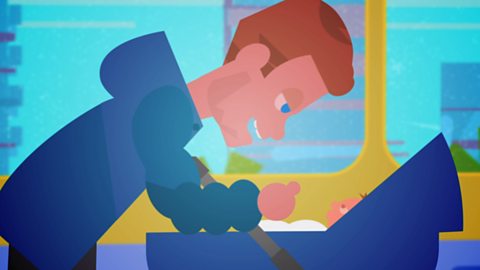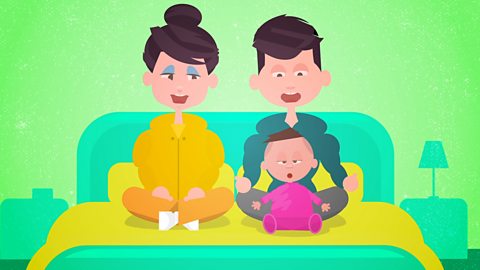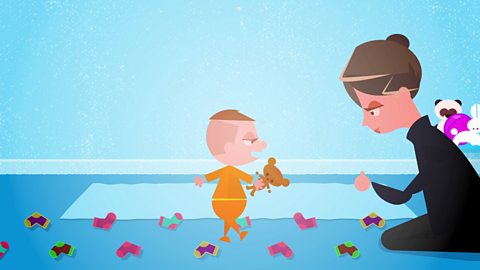Baby babble isn't just adorable, it's an early stage of your baby learning how to speak.
All babies babble in the same way initially, no matter where in the world they're from. It's how we speak to them that shapes their language.
We caught up with Gert Westermann, Professor of Psychology at Lancaster University, to find out more about how babies begin to make speech sounds and how parents can help them build their babble into words.
Babble, babble, babble, youÔÇÖve probably noticed your little one chatting away to themselves, so what exactly are they up to?
Well, theyÔÇÖre not bored and theyÔÇÖre not speaking a different language, babies babble when theyÔÇÖre ready to learn! From the moment theyÔÇÖre born, babies can make every sound that any human can make.┬á But they havenÔÇÖt learned to use their mouth muscles to make specific sounds. So, when theyÔÇÖre very young, theyÔÇÖre just experimenting with different sounds and mouth shapes
But by three to six months, babies begin tuning into the languages around them, becoming experts at recognising the sounds they hear every day. So, baby talk is actually very important ÔÇôtheyÔÇÖre practising! TheyÔÇÖre exercising those muscles they need to make the sounds of their parentÔÇÖs language. We know this because, at around three months old, babies in the UK and China make the very same cooing and gurgling noises but by five - eight months, as their awareness increases and their mouth muscles develop, they sound different, because their babbling adapts to the language they hear.
To help your baby develop speech, the next time your baby babbles, make the same sounds they make back to might feel silly, but repeating their 'goo goo ga ga's helps them learn what they sound like ,and the right way to make the sounds.YouÔÇÖre also showing them how to take turns, which will be important when they get speaking!
When do babies start babbling?
ÔÇ£They start making noises really shortly after birth, and of course, they become more sophisticated during the first year of life. Babies start squealing and growling and making raspberry sounds really quite early on,ÔÇØ says Gert.
However, the sorts of sounds we usually think of as ÔÇÿbabblingÔÇÖ, the repetitive gagaga/bababa-type sounds, are heard more often from around 6 months of age. Simple vowel sounds like ÔÇÿahÔÇÖ happen earlier, around 3-4 months of age.
What are babies doing when they babble?
ÔÇ£I guess the simple explanation of why they babble is that they are practising producing sounds,ÔÇØ says Gert. ÔÇ£They practise using their lips, tongues and vocal cords, gaining progressive control of their vocal cords in the first 6 months.ÔÇØ
Are babies trying to say words when they babble?
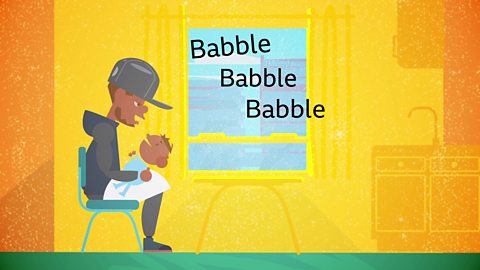
Gert is keen for parents to understand that babble isn't just babies practising making sounds but a way for them to communicate with adults around them. They want to tell you something about the world, even if they donÔÇÖt have the words to say it yet. ÔÇ£ThereÔÇÖs evidence that even some 8/9 month olds, when there are objects their parents have named for them, begin to change the consonant sounds they make to imitate their parentsÔÇÖ words, even with their limited vocal abilities.ÔÇØ So babbling is much more than a string of sounds: ÔÇ£It is them reacting to their environmentÔÇØ.
Babble plays an important function too: itÔÇÖs a way of babies engaging adultsÔÇÖ attention. By babbling, they come to learn they can provoke a response from you. ÔÇ£ThereÔÇÖs something called the still-face experiment,ÔÇØ Gert says. ÔÇ£If the baby and an adult are playing and chatting together and suddenly the adult stops still and holds a blank expression, the baby will babble even more to try and get the adult to engage with them again.ÔÇØ

Why does my baby mostly make 'bababa'/'gagaga'/'mamama' sounds?
The reason why babies make a lot of the same sorts of sounds when they first start to babble is pretty simple, according to Gert.
ÔÇ£Those sounds are easier to make than others. ÔÇÿShhhÔÇÖ and ÔÇÿfffffÔÇÖ sounds are much harder for children to make - you have to blow quite hard, and you have to kind of press your lips and your teeth together, whereas ÔÇÿgaÔÇÖ and ÔÇÿguhÔÇÖ type sounds only require you to open and close the epiglottis at the back of your throat. Babies start with sounds that are easy to produce and then quite a bit later they learn to make these more complex sounds.ÔÇØ
How should adults respond to baby babble?
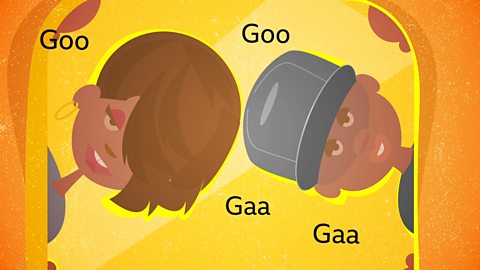
Because babbling forms childrenÔÇÖs early attempts at communication, adults can try and treat babies as conversation partners. ÔÇ£Take the noises babies make seriously,ÔÇØ says Gert.
DonÔÇÖt assume that because they canÔÇÖt speak, you canÔÇÖt speak with them. They might not offer you any great insights, but act as if they are!
ÔÇ£Just take a moment to think, what is it they might be trying to say? Is there a common focus like a toy or something to talk to them and tell them about? Responding in this way has been shown to further increase the amount babies babble.ÔÇØ
ThereÔÇÖs a particular way that Gert suggests we interact with babies before they can speak too. ÔÇ£Turn-taking responses where you respond to the childÔÇÖs babble, wait, and allow them to make more noise in return are especially good for the childÔÇÖs development. ItÔÇÖs a really rewarding way for them to interact, even at a very young age.ÔÇØ So if you respond to your babyÔÇÖs babble and then allow them time to make more noise, theyÔÇÖll understand that itÔÇÖs their turn to communicate. This shows them that you are listening and that their noises are important, key to conversation later on.

When does babble become words?
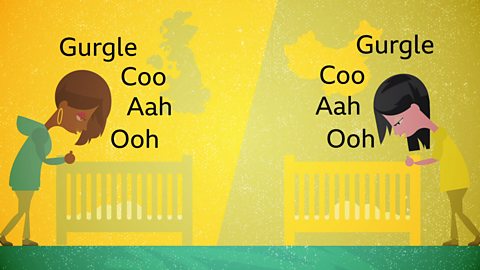
ÔÇ£ItÔÇÖs usually around 12 months when babies begin to say their first words, some later, some earlier ÔÇô all babies develop differently,ÔÇØ Gert stresses.
Around the world, early baby babble sounds similar, starting with the same set of vocal sounds, but these develop differently depending on the influence of adults talking around babies. ÔÇ£ThereÔÇÖs some debate over how babies move towards making the sounds of their parentsÔÇÖ language,ÔÇØ says Gert. ÔÇ£It certainly seems that by the end of the first year, the vowel sounds that babies produce when babbling move towards those of their native language.ÔÇØ
Babies start producing sounds, perhaps involuntarily at first, and then they start playing with them, practising them, exploring what they can do. And then, when they hear words, they try to imitate them, and then suddenly theyÔÇÖve entered the world of language.


